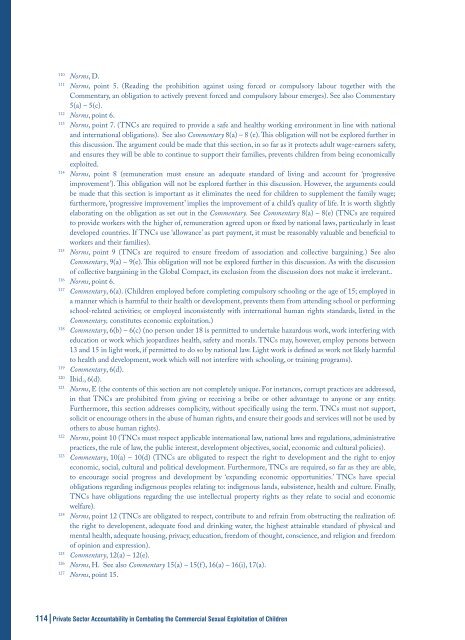110Norms, D.111Norms, po<strong>in</strong>t 5. (Read<strong>in</strong>g <strong>the</strong> prohibition aga<strong>in</strong>st us<strong>in</strong>g forced or compulsory labour <strong>to</strong>ge<strong>the</strong>r with <strong>the</strong>Commentary, an obligation <strong>to</strong> actively prevent forced and compulsory labour emerges). See also Commentary5(a) – 5(c).112Norms, po<strong>in</strong>t 6.113Norms, po<strong>in</strong>t 7. (TNCs are required <strong>to</strong> provide a safe and healthy work<strong>in</strong>g environment <strong>in</strong> l<strong>in</strong>e with nationaland <strong>in</strong>ternational obligations). See also Commentary 8(a) – 8 (e). This obligation will not be explored fur<strong>the</strong>r <strong>in</strong>this discussion. The argument could be made that this section, <strong>in</strong> so far as it protects adult wage-earners safety,and ensures <strong>the</strong>y will be able <strong>to</strong> cont<strong>in</strong>ue <strong>to</strong> support <strong>the</strong>ir families, prevents children from be<strong>in</strong>g economicallyexploited.114Norms, po<strong>in</strong>t 8 (remuneration must ensure an adequate standard of liv<strong>in</strong>g and account for ‘progressiveimprovement’). This obligation will not be explored fur<strong>the</strong>r <strong>in</strong> this discussion. However, <strong>the</strong> arguments couldbe made that this section is important as it elim<strong>in</strong>ates <strong>the</strong> need for children <strong>to</strong> supplement <strong>the</strong> family wage;fur<strong>the</strong>rmore, ‘progressive improvement’ implies <strong>the</strong> improvement of a child’s quality of life. It is worth slightlyelaborat<strong>in</strong>g on <strong>the</strong> obligation as set out <strong>in</strong> <strong>the</strong> Commentary. See Commentary 8(a) – 8(e) (TNCs are required<strong>to</strong> provide workers with <strong>the</strong> higher of, remuneration agreed upon or fixed by national laws, particularly <strong>in</strong> leastdeveloped countries. If TNCs use ‘allowance’ as part payment, it must be reasonably valuable and beneficial <strong>to</strong>workers and <strong>the</strong>ir families).115Norms, po<strong>in</strong>t 9 (TNCs are required <strong>to</strong> ensure freedom of association and collective barga<strong>in</strong><strong>in</strong>g.) See alsoCommentary, 9(a) – 9(e). This obligation will not be explored fur<strong>the</strong>r <strong>in</strong> this discussion. As with <strong>the</strong> discussionof collective barga<strong>in</strong><strong>in</strong>g <strong>in</strong> <strong>the</strong> Global Compact, its exclusion from <strong>the</strong> discussion does not make it irrelevant..116Norms, po<strong>in</strong>t 6.117Commentary, 6(a). (<strong>Child</strong>ren employed before complet<strong>in</strong>g compulsory school<strong>in</strong>g or <strong>the</strong> age of 15; employed <strong>in</strong>a manner which is harmful <strong>to</strong> <strong>the</strong>ir health or development, prevents <strong>the</strong>m from attend<strong>in</strong>g school or perform<strong>in</strong>gschool-related activities; or employed <strong>in</strong>consistently with <strong>in</strong>ternational human rights standards, listed <strong>in</strong> <strong>the</strong>Commentary, constitutes economic exploitation.)118Commentary, 6(b) – 6(c) (no person under 18 is permitted <strong>to</strong> undertake hazardous work, work <strong>in</strong>terfer<strong>in</strong>g wi<strong>the</strong>ducation or work which jeopardizes health, safety and morals. TNCs may, however, employ persons between13 and 15 <strong>in</strong> light work, if permitted <strong>to</strong> do so by national law. Light work is def<strong>in</strong>ed as work not likely harmful<strong>to</strong> health and development, work which will not <strong>in</strong>terfere with school<strong>in</strong>g, or tra<strong>in</strong><strong>in</strong>g programs).119Commentary, 6(d).120Ibid., 6(d).121Norms, E (<strong>the</strong> contents of this section are not completely unique. For <strong>in</strong>stances, corrupt practices are addressed,<strong>in</strong> that TNCs are prohibited from giv<strong>in</strong>g or receiv<strong>in</strong>g a bribe or o<strong>the</strong>r advantage <strong>to</strong> anyone or any entity.Fur<strong>the</strong>rmore, this section addresses complicity, without specifically us<strong>in</strong>g <strong>the</strong> term. TNCs must not support,solicit or encourage o<strong>the</strong>rs <strong>in</strong> <strong>the</strong> abuse of human rights, and ensure <strong>the</strong>ir goods and services will not be used byo<strong>the</strong>rs <strong>to</strong> abuse human rights).122Norms, po<strong>in</strong>t 10 (TNCs must respect applicable <strong>in</strong>ternational law, national laws and regulations, adm<strong>in</strong>istrativepractices, <strong>the</strong> rule of law, <strong>the</strong> public <strong>in</strong>terest, development objectives, social, economic and cultural policies).123Commentary, 10(a) – 10(d) (TNCs are obligated <strong>to</strong> respect <strong>the</strong> right <strong>to</strong> development and <strong>the</strong> right <strong>to</strong> enjoyeconomic, social, cultural and political development. Fur<strong>the</strong>rmore, TNCs are required, so far as <strong>the</strong>y are able,<strong>to</strong> encourage social progress and development by ‘expand<strong>in</strong>g economic opportunities.’ TNCs have specialobligations regard<strong>in</strong>g <strong>in</strong>digenous peoples relat<strong>in</strong>g <strong>to</strong>: <strong>in</strong>digenous lands, subsistence, health and culture. F<strong>in</strong>ally,TNCs have obligations regard<strong>in</strong>g <strong>the</strong> use <strong>in</strong>tellectual property rights as <strong>the</strong>y relate <strong>to</strong> social and economicwelfare).124Norms, po<strong>in</strong>t 12 (TNCs are obligated <strong>to</strong> respect, contribute <strong>to</strong> and refra<strong>in</strong> from obstruct<strong>in</strong>g <strong>the</strong> realization of:<strong>the</strong> right <strong>to</strong> development, adequate food and dr<strong>in</strong>k<strong>in</strong>g water, <strong>the</strong> highest atta<strong>in</strong>able standard of physical andmental health, adequate hous<strong>in</strong>g, privacy, education, freedom of thought, conscience, and religion and freedomof op<strong>in</strong>ion and expression).125Commentary, 12(a) – 12(e).126Norms, H. See also Commentary 15(a) – 15(f ), 16(a) – 16(i), 17(a).127Norms, po<strong>in</strong>t 15.114|Private Sec<strong>to</strong>r Accountability <strong>in</strong> Combat<strong>in</strong>g <strong>the</strong> Commercial Sexual Exploitation of <strong>Child</strong>ren
128Commentary, 15(a) – 15(f ) (TNCs must make <strong>in</strong>ternal rules and implementation procedures available <strong>to</strong>stakeholders, provide tra<strong>in</strong><strong>in</strong>g <strong>to</strong> managers and workers, ensure bus<strong>in</strong>ess partners follow <strong>the</strong> Norms or similarnorms, disclose <strong>in</strong><strong>format</strong>ion regard<strong>in</strong>g activities, structure, f<strong>in</strong>ances and performance, <strong>in</strong>form stakeholderswhen <strong>the</strong>ir health, safety or <strong>the</strong> environment may be endangered by <strong>the</strong>ir activities and cont<strong>in</strong>ually improveimplementation).129Norms, po<strong>in</strong>t 16 (requires moni<strong>to</strong>r<strong>in</strong>g be transparent, <strong>in</strong>dependent and take account of <strong>in</strong>put from stakeholders).TNCs <strong>the</strong>mselves also have obligations regard<strong>in</strong>g moni<strong>to</strong>r<strong>in</strong>g. See Commentary 16(d) (for <strong>in</strong>stance, mak<strong>in</strong>greports on workplaces observed and remediation efforts undertaken as a result of moni<strong>to</strong>r<strong>in</strong>g <strong>to</strong> relevantstakeholders). See also Commentary 16(g) (TNCs are obligated <strong>to</strong> conduct periodic assessment of compliancewhich takes account of stakeholders <strong>in</strong>put).130Commentary, 16(a) – 16(c) (it is suggested moni<strong>to</strong>r<strong>in</strong>g be undertaken by UN human rights treaty bodies or<strong>the</strong> Commission on Human Rights by creat<strong>in</strong>g report<strong>in</strong>g requirements and mechanisms. Fur<strong>the</strong>rmore, it issuggested that <strong>the</strong> Sub-Commission and work<strong>in</strong>g group moni<strong>to</strong>r compliance and develop best practices byreceiv<strong>in</strong>g <strong>in</strong><strong>format</strong>ion from stakeholders. F<strong>in</strong>ally, stakeholders are encouraged <strong>to</strong> use <strong>the</strong> Norms: trade unions asa basis of negotiat<strong>in</strong>g agreements; NGOs as a basis for expectations of conduct and <strong>in</strong>dustry groups <strong>to</strong> moni<strong>to</strong>rcompliance).131Commentary, 16(e), 16(f ).132Ibid., 16(i) (TNCs are obligated <strong>to</strong> study human rights impacts of potential <strong>in</strong>itiatives or projects).133Ibid., 16(h) (TNCs are obligated <strong>to</strong> <strong>in</strong>clude action plans or methods of reparation and redress if assessmentsreveal <strong>in</strong>adequate compliance).134Norms, po<strong>in</strong>t 17.135Ibid (specifically reparations, restitution, compensation and rehabilitation).136Three possible read<strong>in</strong>gs have been noted <strong>in</strong> <strong>the</strong> literature: Strong, which suggests a duty <strong>to</strong> translate <strong>the</strong> Norms<strong>in</strong><strong>to</strong> national legislation; weak, which suggests an obligation <strong>to</strong> develop ‘operative human rights culture’ forTNCs; eclectic, which suggests progressive implementation.137ILO. Tripartite Declaration of Pr<strong>in</strong>ciples Concern<strong>in</strong>g Mult<strong>in</strong>ational Enterprises and Social Policy. Geneva:International Labour Office, 1977; Declaration on Fundamental Pr<strong>in</strong>ciples and Rights at Work. Geneva: ILO,1977. In 1972, a tripartite meet<strong>in</strong>g was established <strong>to</strong> explore <strong>the</strong> relationship between MNEs and Social Policy.Later, a tripartite group was established <strong>to</strong> prepare a Draft Declaration, which was adopted by <strong>the</strong> Govern<strong>in</strong>gBody of <strong>the</strong> ILO <strong>in</strong> 1977. S<strong>in</strong>ce <strong>the</strong>n, <strong>the</strong> Declaration has undergone some changes: <strong>the</strong> text has been revised(<strong>in</strong> 2000 (ILO. Tripartite Declaration (3rd ed). Geneva: ILO, 2000) and 2006 (ILO. Tripartite Declaration (4<strong>the</strong>d). Geneva: ILO, 2006), relevant Recommendations and Conventions, and those referred <strong>to</strong> <strong>in</strong> <strong>the</strong> TripartiteDeclaration, have been updated (<strong>in</strong> 1987, 1995, 2000 and 2006), a follow-up procedure has been added (<strong>in</strong> 1980and updated <strong>in</strong> 1987) and <strong>the</strong> Declaration has <strong>in</strong>corporated <strong>the</strong> Fundamental Pr<strong>in</strong>ciples and its follow-upprocedure (<strong>in</strong> 2000). At its 295th session <strong>in</strong> March of 2006, <strong>the</strong> Govern<strong>in</strong>g Body adopted an updated version of<strong>the</strong> Declaration (ILO. Tripartite Declaration (4th ed.). Geneva: ILO, 2006).138ILO. Tripartite Declaration (4th ed). Geneva: ILO, 2006. Para. 1.139Ibid., para. 6 (for <strong>in</strong>stance, MNEs may be of public, mixed or private ownership operat<strong>in</strong>g outside of <strong>the</strong>ir homecountry and generally <strong>in</strong>clude parent companies and local entities).140Ibid., para. 7 (importantly, <strong>the</strong> voluntary observance of <strong>the</strong> Tripartite Declaration does not “… limit or affec<strong>to</strong>bligations aris<strong>in</strong>g out of <strong>the</strong> ratification of any ILO Convention”).141Ibid., para. 5. See also para. 3 (Governments are <strong>to</strong> fur<strong>the</strong>r this aim by adopt<strong>in</strong>g “… appropriate laws and policies,measures and actions…” while labour organisations are <strong>to</strong> cooperate amongst <strong>the</strong>mselves and governments of‘all countries’). See also para. 4, Belgian Case no. 1 (“… no one party can be regarded as a ma<strong>in</strong> beneficiary of <strong>the</strong>Declaration; each, with<strong>in</strong> its sphere of action, is both a beneficiary of and a contribu<strong>to</strong>r <strong>to</strong> <strong>the</strong> co-operative andmutually dependent effort of all <strong>to</strong> fur<strong>the</strong>r social progress, <strong>in</strong> l<strong>in</strong>e with national policy objectives”).142Ibid., “General Policies.” Para. 8 (regard<strong>in</strong>g <strong>in</strong>ternational standards, <strong>the</strong> UDHR, ICCPR, ICESCR and <strong>the</strong>Constitution of <strong>the</strong> ILO are referenced. Parties are also referred <strong>to</strong> <strong>the</strong> ILO Declaration on Fundamental Pr<strong>in</strong>ciplesand Rights at Work, o<strong>the</strong>r commitments entered <strong>in</strong><strong>to</strong> and accepted <strong>in</strong>ternational obligations). See Belgian Caseno. 2(a) (para. 21) (<strong>the</strong> Tripartite Declaration cannot be <strong>in</strong>terpreted <strong>to</strong> exempt any party from comply<strong>in</strong>g wi<strong>the</strong>i<strong>the</strong>r domestic laws or <strong>in</strong>ternational standards; fur<strong>the</strong>rmore pr<strong>in</strong>ciples are addressed <strong>to</strong> and should be fullyrespected and implemented by all parties).Private Sec<strong>to</strong>r Accountability <strong>in</strong> Combat<strong>in</strong>g <strong>the</strong> Commercial Sexual Exploitation of <strong>Child</strong>ren|115
- Page 5 and 6:
PRIVATE SECTOR ACCOUNTABILITYIN COM
- Page 7 and 8:
3. Travel and Tourism Sub-Sector 63
- Page 9 and 10:
Executive SummarySince the First an
- Page 11 and 12:
from the sale of child pornography
- Page 13 and 14:
1.1 Defining Commercial Sexual Expl
- Page 15 and 16:
The issue of commercial sexual expl
- Page 17 and 18:
1.2.1 Transnational and multination
- Page 19 and 20:
offer stronger protections against,
- Page 21 and 22:
1.3 Defining Corporate Social Respo
- Page 23 and 24:
Parliament passed a law requiring a
- Page 25 and 26:
2. International Standards and the
- Page 27 and 28:
In terms of international law, the
- Page 29 and 30:
alia: establish the grounds for cri
- Page 31 and 32:
The ILO Convention No. 138, Concern
- Page 33 and 34:
2.4 Existing Legal Mechanisms to En
- Page 35 and 36:
2.4.2 Existing mechanisms for regul
- Page 37 and 38:
Governments play an auxiliary role
- Page 39:
lack of ) monitoring and enforcemen
- Page 42 and 43:
who follow relevant international l
- Page 44 and 45:
the Commentary references the rule
- Page 46 and 47:
2.4.2.1.2.1 Tripartite DeclarationT
- Page 48 and 49:
Unlike the preceding sections, whic
- Page 50 and 51:
A major criticism of the Tripartite
- Page 52 and 53:
MNEs are asked to respect worker’
- Page 54 and 55:
Guidelines voluntary, but non-OECD
- Page 56 and 57:
An alternative to the above is to r
- Page 58 and 59:
freedom from state interference in
- Page 60 and 61:
During the Nuremburg Tribunals, Ger
- Page 62 and 63:
ATCA expanded liability for interna
- Page 64 and 65:
Pursuant to the holding in Kadic re
- Page 66 and 67:
The Court could establish jurisdict
- Page 68 and 69:
likely come across similar obstacle
- Page 70 and 71:
ecognised by customary internationa
- Page 72 and 73: The report draws together a number
- Page 74 and 75: means of fostering international pe
- Page 76 and 77: a resolution, as well, in which it
- Page 78 and 79: The Swedish document was originally
- Page 80 and 81: services are designed to combat chi
- Page 82 and 83: into contact with individuals who c
- Page 84 and 85: children’s perception of the worl
- Page 86 and 87: advertisement. The European adverti
- Page 88 and 89: high-profile case in the US where a
- Page 90 and 91: child actors have gone on in adulth
- Page 92 and 93: 5. New Technologies Sub-Sector5.1 C
- Page 94 and 95: North American cases illustrate how
- Page 96 and 97: With the advent of the social netwo
- Page 98 and 99: up to $US 500 if they violate the c
- Page 100 and 101: As the genre is so new, there have
- Page 102 and 103: - children’s rights advocates, go
- Page 104 and 105: law enforcement agencies, but equal
- Page 106 and 107: 6. Financial Sub-SectorIt has been
- Page 108 and 109: law enforcement is having trouble u
- Page 110 and 111: encourage cooperation and follow-up
- Page 112 and 113: emedies against all corporations op
- Page 114 and 115: Another important objective of the
- Page 116 and 117: Endnotes1 Mark Erik Hecht is an aca
- Page 118 and 119: 35Canada. Industry Canada. Corporat
- Page 120 and 121: 84On 31 Jan. 1999, UN Secretary-Gen
- Page 124 and 125: 143Ibid., “General Policies.” P
- Page 126 and 127: 179Ibid., Annex, III: Global Report
- Page 128 and 129: of the Guidelines).212Ibid., Part I
- Page 130 and 131: 258Ibid.259UNWTO Report to the UN G
- Page 132 and 133: 310Ibid., 12.311Council of Europe,
- Page 134 and 135: Germany and South Africa, ISPs are
- Page 137: The World Congress III against Sexu




